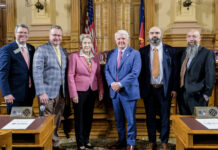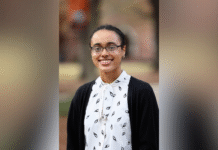Atlanta—With literacy being the cornerstone of a child’s education, students and teachers in Mercer University’s Tift College of Education are learning how to creatively bring the excitement of reading to the kids in their classrooms.
In Dr. Mary Willingham’s Children’s Literature class, graduate education students explore the various ways to teach an appreciation for the written word to young students. Willingham imparts to her students the urgency of making literature an important part of a child’s life so reading can become a tool for lifelong learning.
“My basic objectives for this class are to expose our teachers to the vast body of children’s literature,” said Willingham, a Mercer professor for 22 years. “I strive to help them create exciting questions and activities that will engender a love of reading in their students and to increase their own love of reading and knowledge of literature.”
The course culminates in a Children’s Book and Storytelling Festival, with each student directed to bring at least one child to the program. The Festival, scheduled for 5:30 p.m., Thursday, April 24, on the Cecil B. Day Atlanta campus, is one of Willingham’s ideas for generating interest in reading among children, while allowing her students to showcase what they have learned over the semester.
Wynetta Scott-Simmons of Fayetteville has found that children who enjoy the stories or poetry they performed are more likely to pick up a book and try to find more.
“The Festival will present different types of literature in order to broaden the children’s exposure to books and increase their desire to read,” said the Fayetteville educator, who is earning her specialist in education degree at Mercer.
The 3rd grade teacher at Peeples Elementary School in Fayetteville has used many of Willingham’s ideas with her own students. “In my classroom, reading aloud has been very effective as my students have become interested in different types of books or in books they thought they wouldn’t like. Now, they are more open to all kinds of stories and read the more challenging books that they wouldn’t have picked up before,” said Scott-Simmons, who also earned her master’s degree in education at Mercer’s Tift College of Education in Atlanta.
One of Willingham’s tips for getting kids to read is to create a connection between the child and a book. Semia Hutchings of Decatur, who is pursuing her master of education degree, uses this technique in her classroom.
“A good idea is to see what kind of child you are trying to get excited about reading,” said Hutchings, a 3rd grade teacher at Fountain Elementary School in Forest Park. “If the child is interested in sports, I find a book about sports to get things started. The key is to find out what the kids like and keep a big, diverse class library in which every student can find a book that relates to him or her.”
Teachers can also help students by continuously researching new books to share with their students. Graduate education student Tish Brownlee of Powder Springs reads different types of children’s literature on her own so she can choose the best material for her students.
“We’ve learned in class is to read an extra book each week,” said Brownlee, who teaches in the Cobb County School System. “Since I work in kindergarten, reading all types of children’s books has helped me get into books I wouldn’t have always read. Teachers doing this can share what they’ve read or used in their classrooms to help [teachers and parents] pick the right material for their kids.”
While reading continues to be a child’s foundation for education, finding unique and active ways to engage a classroom remains important. Through ideas like acting out poems and stories, building a diverse classroom library, finding connections between students and books, and reading regularly to be able to recommend material to students, teachers in Willingham’s class have experienced success.
“I have taken these ideas immediately from this class to my third-graders,” said Scott-Simmons. “Anyone can do these things to encourage kids to read, and though some of it may be hard work, it’s work that you don’t mind doing.”
-30-










